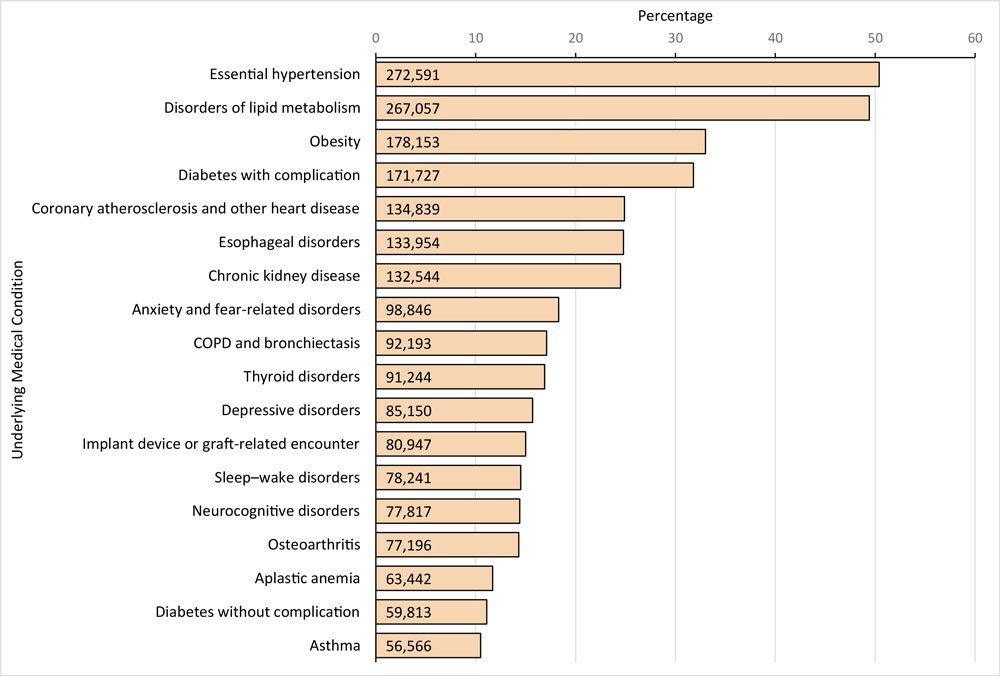American research, technology, and advancements in healthcare are amazing examples of brilliance, innovation, and capacity. The speed at which our healthcare experts rolled out vaccines for COVID-19 is an exemplar that will be studied and admired for decades to come. The world owes these experts a debt that cannot be repaid.
It is also a well-known fact that our healthcare system is mostly oriented to respond to symptoms, illnesses, and disease care more than building health and wellness. This focus becomes evident when we consider the president’s recently announced vaccine strategy. It’s not an anti-vaccination statement to say, vaccinating Americans will not make Americans healthy.
A July 2021 study published by the CDC, “Underlying Medical Conditions and Severe Illness Among 540,667 Adults Hospitalized With COVID-19, March 2020 – March 2021” provides insight into the importance of health and wellness as a preventative COVID-19 strategy.
This study looked at the health conditions that were associated with severe COVID-19 illness. Severe COVID-19 illness was defined by three care factors: patients admitted to intensive care, patients that required invasive mechanical ventilation and, patients that died. The study showed that 94.9 percent of individuals who had severe COVID-19 also had at least one underlying medical condition: hypertension (e.g., high blood pressure, 50.4 percent), lipid metabolism (e.g., high cholesterol, 49.4 percent), and obesity (33 percent). A full list of these medical conditions from the study appears in the table.

SOURCE: Kompaniyets L, Pennington AF, Goodman AB, Rosenblum HG, Belay B, Ko JY, et al. Underlying Medical Conditions and Severe Illness Among 540,667 Adults Hospitalized With COVID-19, March 2020–March 2021. Prev Chronic Dis 2021;18:210123
What is common among many of these health conditions are the significant influence lifestyle choices have in controlling them. This is particularly true for the top three causes of severe COVID-19. Of course, hereditary factors play a role in these conditions for some people, but for many people, these health conditions can be controlled with lifestyle choices. The Mayo Clinic lists 10 ways to control hypertension (high blood pressure) that include lifestyle choices such as exercise, eating healthy foods, and maintaining an appropriate weight. The National Institutes of Health states, “Lifestyle modification plays a significant role in the treatment of lipid metabolism disorders [e.g., high cholesterol].”
The lesson we might take from this is health and wellness should be a key strategy in the avoidance of severe COVID-19 effects.
This concept is further emphasized when the data is evaluated more deeply. Considering the health conditions associated with COVID-19 deaths, we find some similarities and a surprising standout. Obesity is the top health condition contributing to death with a 30 percent higher chance of death, and diabetes with complications with a 26 percent higher chance of death. Like the others, lifestyle choices can have a significant influence on controlling these health conditions. Again, this emphasizes the importance of maintaining as a preventative factor, a healthy lifestyle.
Surprisingly, anxiety and fear-related disorders increased the chance of death from COVID-19 by 28 percent. That is the second-highest health condition accompanying death from COVID-19. The study considers that there may be multiple factors that contribute to this, such as anxiety keeping someone from seeking medical treatment for COVID-19.
The elevated risk of death for those with anxiety and fear-related disorders may be important for policymakers as well as the media. For over 18 months, much of the media coverage has emphasized the risks, dangers, and tragic outcomes of the pandemic, possibly compounding anxiety levels. Little, if any, coverage has focused on the efficacy of making healthy choices as a COVID-19 health strategy.
This study provides compelling results that support the importance of a focus on lifestyle choices for healthy outcomes. Those choices, we know, have a positive effect on COVID-19 resilience. We also know that they have a positive effect on resilience to many of the diseases that lead to severe COVID-19 outcomes.
If ever you needed a reason to make a commitment to get healthy, a global pandemic could be just the ticket.

